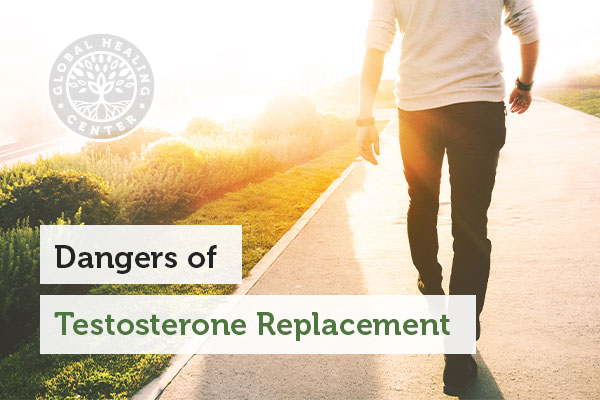
Testosterone replacement therapy is a topic with many angles and one that has gotten the most attention is safety. Advocates for testosterone replacement therapy, or TRT, say the approach offers many benefits, including libido support, energy, increased muscle mass and strength, and stronger bones. Some research has even placed TRT as a helpful therapy for cardiovascular health. Opponents, however, cite research that points out HRT's lows, including its possible role for increasing prostate cancer.
So, what are the facts? Well, the answer may lie somewhere in-between. Are there benefits? Of course, but at what cost? That said, it may be worth checking out other safe, more natural options that exist for boosting testosterone, approaches that have very little to no side effects (or even cost) to men.
Dangers of Testosterone Replacement Therapy
Taking testosterone isn't like taking a vitamin. Testosterone is a hormone, one that is naturally produced by the testicles and ovaries in humans. This hormone is responsible for a number of physical characteristics, including the onset of puberty. It is crucial for normal sperm growth and development, and supports fertility in males.
TRT has shown to produce many short-term benefits; however, this treatment is fairly new and the side effects have already begun to appear. Here are three of the most commonly-reported side effects associated with testosterone replacement therapy.
1. Blood Clotting
The clotting of blood is a necessary process that occurs in response to a wound, but the unnecessary thickening of blood in the body can lead to strokes or deep vein thrombosis (DVT).
2. Vital Organ Issues
Liver disease, swelling of the arms and legs, and heart concerns have all been reported following TRT. One study indicated that men over 65 using testosterone therapy had a higher risk for cardiovascular disease. [1]
3. Prostate Cancer
Some researchers claim that increasing testosterone levels unnaturally may increase the risk of developing prostate cancer. The jury is still out, however, pending research. [2]
Natural Alternatives
Although benefits have been consistently reported, the real long-term impacts remain unknown. Here are just a few natural nutritional approaches that may benefit testosterone, libido, and mood:
1. Monounsaturated Fats
Fats from olive oil, avocados, and almonds are very high in monounsaturated fatty acids, types of fats that have been shown to increase testosterone levels in men. [3] Olive oil shows the most benefit, so start using more of this nutritious oil in your cooking, on salads, and drizzled over cooked vegetables.
2. Vitamin D
The hype surrounding vitamin D is scientifically justified, especially since research shows that this powerful nutrient increases testosterone levels. While fish is somewhat high in vitamin D, the best sources are the sun and supplements. Vitamin D supplementation is especially important in older men, particularly those that do not receive adequate sunlight exposure on an ongoing basis. [4]
3. Zinc
Zinc is an essential nutrient needed for testosterone production, so including more foods rich in this mineral may be helpful for boosting hormone levels in the body. [5] Foods high in zinc include watermelon seeds, sesame seeds, pumpkin seeds, and cashews. Basically, all nuts and seeds will provide a great vegan source of zinc.

One Final Thought
Nutrition, exercise, and overall lifestyle may be helpful for supporting healthy testosterone levels. There are also a number of herbs that support hormonal balance and supplements such as Androtrex® that offer complete, all-in-one blends.
References (5)
- Osterberg EC, Bernie AM, Ramasamy R. Risks of testosterone replacement therapy in men. Indian J Urol. 2014 Jan;30(1):2-7.
- Cui Y, et al. "The Effect Of Testosterone Replacement Therapy On Prostate Cancer: A Systematic Review And Meta-Analysis.". Ncbi.nlm.nih.gov. N.p., 2017. Web. 12 June 2017.
- Derouiche A, Jafri A, Driouch I, El Khasmi M, Adlouni A, Benajiba N, Bamou Y, Saile R, Benouhoud M. Effect of argan and olive oil consumption on the hormonal profile of androgens among healthy adult Moroccan men. Natural Product Communications. 2013 January;8(1):51-3.
- Pilz S, Frisch S, Koertke H, Kuhn J, Dreier J, Obermayer-Pietsch B, Wehr E, Zittermann A. Effect of vitamin D supplementation on testosterone levels in men. Hormone and Metabolic Research. 2011 March;43(3):223-5. doi: 10.1055/s-0030-1269854.
- Netter A, Hartoma R, Nahoul K. Effect of zinc administration on plasma testosterone, dihydrotestosterone, and sperm count. Archives of Andrology. 1981 August;7(1):69-73.
†Results may vary. Information and statements made are for education purposes and are not intended to replace the advice of your doctor. If you have a severe medical condition or health concern, see your physician.








